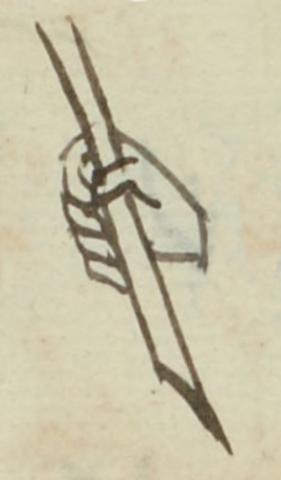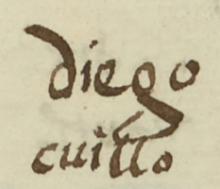Cuilo (MH497v)
This black-line drawing of the simplex glyph for the personal name Cuilo (perhaps "He Wrote" or "He Painted," from the verb cuiloa or icuiloa) is attested here as a man's name. The glyph shows a (right) hand holding a writing or painting instrument (a noun), point down.
Stephanie Wood
Marc Thouvenot identifies the verb icuiloa (or ihcuiloa, with the glottal stop), which means to paint, write, or print, as having a root of -cuil-. He notes how it also appears in tlacuiloliztli (writing), tlacuilo (writer), and cuicuiltic (mottled). He goes on to show various uses of icuiloa that take it beyond the simple definitions just given, resulting in something like the action of creating a design (e.g., on leather, ceramics, sculpture, or in textiles). It can also be something like the action of decorating (e.g., to put a flower on a cup of atole). He associates icuiloa and tlacuilolli with "cultural artifacts," such as arts and crafts or examples of writing and painting, but cuicuiltic with effects created by "nature." This short summary barely does his article justice; it is worth reading the entire piece. How Thouvenot's study might connect with the concept of bent or curved mentioned by Prem (1974: 555, 682) raises an interesting question. Perhaps the bent or curved lines of writing, painting, carving, embroidery, and so on, fall with in the realm of expressions of -cuil-. See
Marc Thouvenot, "Imágenes y escritura entre los nahuas del inicio del XVI," Estudios de Cultural Náhuatl 41 (2010).
1560
Jeff Haskett-Wood
nombres de hombres

cuiloa, to write-paint (verb), https://nahuatl.wired-humanities.org/content/cuiloa
tlacuilo, writer-painter, https://nahuatl.wired-humanities.org/content/tlacuilo
Matrícula de Huexotzinco, folio 497v, World Digital Library, https://www.loc.gov/resource/gdcwdl.wdl_15282/?sp=74&st=image
This manuscript is hosted by the Library of Congress and the World Digital Library; used here with the Creative Commons, “Attribution-NonCommercial-ShareAlike 3.0 License” (CC-BY-NC-SAq 3.0).


